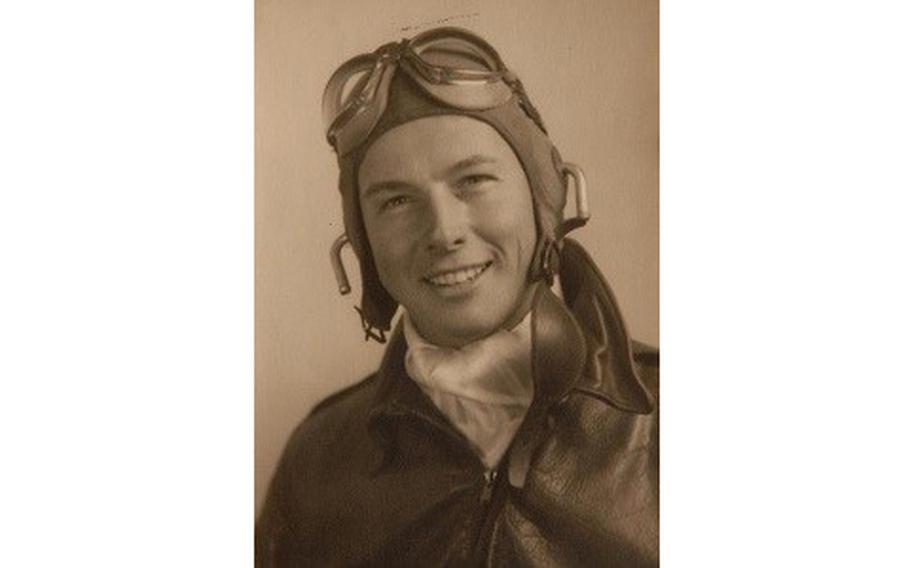
Eugene P. Shauvin (Defense POW/MIA Accounting Agency)
(Tribune News Service) — After more than two decades of searching for her father, Linda Chauvin will see him return home to Spokane, Wash., this summer.
U.S. Army Air Forces 2nd Lt. Eugene P. Shauvin, who was a Camas mill worker, was killed in an attack during his service in World War II; his body remained scattered at a crash site in Belgium until spring 2021. He was officially accounted for March 2 after a series of excavations and anthropological analyses.
Shauvin's hometown will welcome the pilot's return after being missing for 78 years. A ceremony is planned for July, where an honor guard will perform taps and a 21-gun salute. The pilot is survived by Chauvin, 80, and all those who made it their mission to locate and bring him home to Washington state.
A daughter's pursuit
The quest began when Chauvin, who lives in Charlottesville, Va., submitted a query on a military aircraft website in 1999, and it soon connected her with researchers and historians, the U.S. Army Central Identification Lab in Hawaii and a survivor of the crash. She was even "adopted" by a Belgian family who lived near the crash site and became friends with excavation team members.
"I think so many children who didn't have a father always wondered about that person," she said. "I was always asking questions about my father and trying to meet people who knew him or grew up with him."
When Chauvin was 3 years old, her father left to serve in World War II as a pilot in Operation Market Garden, the Allies' 1944 airborne mission to advance into northern Germany.
Shauvin was responsible for flying a Douglas C-47 Skytrain to the Netherlands to deploy pathfinder paratroopers, but the aircraft was shot down as it soared above Belgium and crashed near the village of Retie. Through her research, Chauvin gleaned that smoke billowed from the cockpit as bullets struck the plane's left fuel tank. A fire began to consume the aircraft, which was followed by an explosion.
Six paratroopers bailed out of the plane as the pilot attempted to crash land in the area's expansive fields; yet, the nine remaining crew members died. Shauvin was 25 years old. Out of his seven brothers to serve in the war, he was the only one to die during his service, Chauvin said.
Village residents recovered eight bodies from the crash a few days later and interred them in a temporary mass grave. They were later identified; Shauvin was the last person to be accounted for.
It took decades longer and screening more than 1,000 tons of soil with advanced equipment to find the lone serviceman.
A recovery team was sent to the crash site in 2003, but they were unable to recover Shauvin's remains. After a series of negotiations and Chauvin's unrelenting fortitude to have the case revisited, a Defense POW/MIA Accounting Agency team traveled to Belgium to fully excavate the site in 2021.
Apryl Hall, a member of the excavation crew, said the dig was arduous as they endured through cold, wet and windy conditions, but their emotional investment in the case kept spirits high.
Chauvin was able to join the crew on both occasions, even with the COVID-19 pandemic looming in the background of the second excursion — requiring her to receive special government permission to navigate restrictions banning tourist travel.
"She would let us know how much she appreciated us when we were within earshot," Hall said. "Within 30 minutes of knowing Linda, I knew we had to find her dad."
Keeping a legacy alive
Shauvin's name appears on a monument dedicated to Camas paper mill workers who were killed during World War II. The memorial, erected in 1947, sits across from the mill at the corner of Northwest Sixth Avenue and Division Street and is set to be relocated to Crown Park, an upgrade from its barely known spot.
Chauvin's effort to keep the 22 fallen soldiers' memories alive prompted the revival and move. Trang Lam, Camas parks and recreation director, said the city is in the process of determining how and when to move the monument.
Shauvin lived his whole life with a misspelled last name. He resented the mistake a nun had made when he was a child, as she switched the "C" with an "S" — not understanding its French pronunciation. He told his wife that he intended to legally correct the spelling after the war, his daughter said.
Although Shauvin couldn't return home and fulfill his wish, Chauvin changed her name to honor her father, she said. In a sense, she became a living and breathing dedication to the pilot, as she traverses the world as he intended to.
(c)2022 The Columbian (Vancouver, Wash.)
Visit The Columbian (Vancouver, Wash.) at www.columbian.com
Distributed by Tribune Content Agency, LLC.